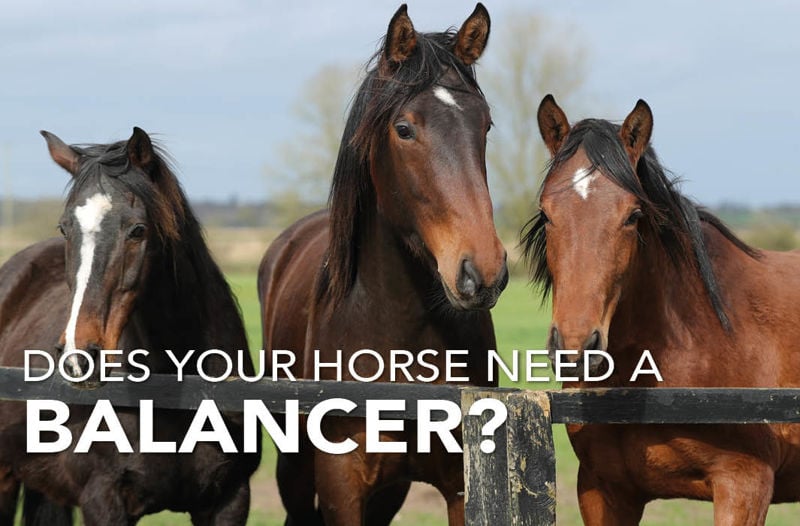What is an equine feed balancer?
A balanced diet is vital to keep your horse happy, healthy and performing at the optimal level for what you require. All horses are unique, and this includes their nutritional requirements which can differ due to a variety of reasons such as forage quality, soil types in your area, the horse’s age and lifestyle. Therefore, it is important to pick a balancer that is suited to your horse.
A balancer is simply a concentrated pellet or powder that contains a wide range of essential vitamins and minerals along with amino acids which are needed in the horse’s diet each day. A forage only diet, which they may not be receiving from a forage-only diet or a restricted diet. The horse is also likely to be lacking these vital nutrients if they are not being fed the full recommended quantity of hard feed for their weight/workload/condition.

Some balancers may contain additional ingredients for specific support in areas such as digestion, respiratory health, joint support, or hoof health.
As balancers are fed in very small quantities, the total sugar and starch is relatively low, therefore making them suitable for a wide range of horses.
How are feed balancers and general vitamin and mineral feed supplements different?
Balancers often, but not always, come in a pelleted form that can be fed on their own if necessary and usually contain additional amino acids, whereas most general vitamin and mineral supplements are fed in powdered form. Pelleted balancers may be higher in calories, sugar and starch than the powdered alternative as extra ingredients are required to bind them into pellet form, however the feeding rate is very low and therefore the different in calories is very minor. Powdered balancers are generally more cost effective.
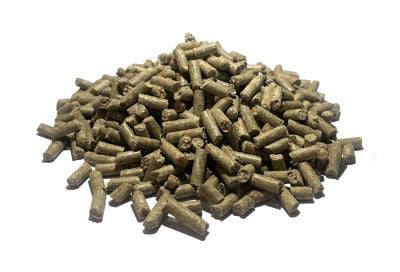
Feeding the good doer - can a balancer help?
Whilst some horses require hard feed all year round, others are good doers who can maintain their weight and condition on forage alone, this is where a balancer can come in very handy. The calorie intake of a balancer is very low and many pelleted ones can even be fed on their own without the need for any hard feed. Balancers suitable for these types of horses will often contain added amino acids and Omega 3 to make up for what they may not be receiving from the rest of their diet.
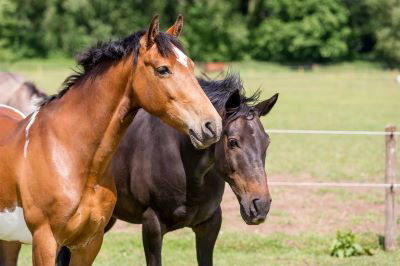
How to choose the right feed balancer for your horse
It can be rather confusing with the many types of balancers on the market, but choosing the right option depends on your individual horse’s needs. Here are some examples of specific types of balancer available:
“Lite”, “low calorie” or “slim” – these are often very low in sugar and starch and so are suitable for those prone to weight gain who may be on a restricted diet. These can also be a good option for horses with an insulin sensitivity or metabolic disorder.
“Performance” – may include ingredients for joint support, pre and probiotics for digestion and even electrolytes to suit competition horses with multiple requirements.
“Veteran” or “senior” – this type of balancer can incorporate ingredients such as Glucosamine and extra Magnesium to aid joint and muscle health. Some may also have added immune support.
“Leisure” or “general” – these are usually everyday balancers suitable for horses in low level work such as hacking and light schooling.
“Stud” – these can be used for broodmares, youngstock and potentially for stallions too. They contain higher levels of certain minerals such as Copper, Zinc and Manganese to match the requirements of breeding stock.
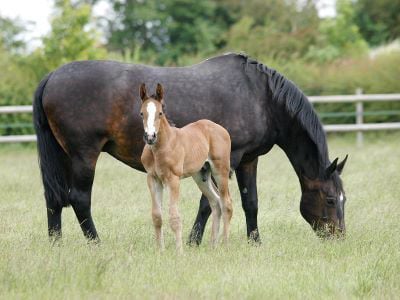
Some vitamin and mineral supplements can even come in the form of a stable or field lick. These can be good for horses who do not receive any feed due to being out at pasture 24/7 e.g. retired horses. The downside to these is that you cannot ensure the horse is receiving the correct nutrients on a daily basis.
Above are just a few common examples of types of feed balancers, but always look at the ingredients on the bag or tub to see if the product suits your horse’s dietary requirements.
Would a feed balancer help my competition horse?
Many owners overestimate the workload of their horses and opt to feed excessive quantities of hard feed, which can lead to weight gain and excessive energy, when simple forage and a balancer may be sufficient for their needs. Horses in “hard work” include racehorses and competition horses with very intensive training programmes. These types of horses are more likely to require higher quantities of feed but horses in lesser workloads may be better suited to a balancer.

Image: Lucy Richards and Wicklow Into Orbit
It is worth noting that not all working horses will need a balancer, particularly if they are receiving all of their required nutrients from their hard feed, forage and possibly other types of supplements, so every horse will be different.
I have a horse on box rest – would a feed balancer help?
Unfortunately, our horses will sometimes require periods of box rest which can increase stress levels and leave them feeling ‘full of beans’. In many cases this means that hard feed is changed or reduced, which should be done gradually in order for the digestive system to adapt. Horses who spend more time in their stables are likely to be lacking in a number of vitamins, minerals and amino acids that they would ordinarily receive whilst grazing.
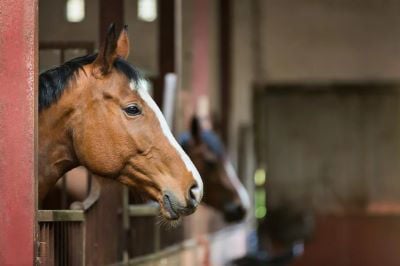
For those on long term rest, good quality ad lib forage paired with a feed balancer should be sufficient for them to maintain their body condition. Choosing a balancer with digestive enhancers can be helpful to sustain a healthy gastric and hind gut environment.
Summary:
Incorporating a balancer into your horse’s diet can be a simple yet effective way to ensure they receive all the essential nutrients needed for optimal health and performance. Whether your horse is a good doer, a competition athlete, or on box rest, the right balancer can help support their specific dietary needs without unnecessary calories or starch. With various options available, selecting the most suitable balancer based on your horse’s lifestyle, workload, and overall health can make a significant difference in their well-being. Always assess their individual requirements to provide the best possible nutrition.
If you are unsure whether a balancer is suitable for your horse, contact our Equine Nutritionists who would be happy to help you. You can email [email protected] or call our freephone advice line on 0800 585525.


